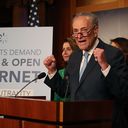Biden's net neutrality rules struck down by appeals court
The Federal Communications Commission lacks the authority to restore net neutrality rules that prevented broadband providers from slowing or blocking access to internet content, a federal appeals court ruled on Thursday.
Why it matters: The all-Republican panel on the U.S. Court of Appeals for the 6th Circuit handed a blow to the Biden administration, Senate Majority Leader Chuck Schumer (D-N.Y.) and other Democrats who've pushed for fair and open internet measures.
Zoom in: Judge Richard Allen Griffin said in the ruling in Cincinnati, Ohio, that broadband internet is an "information service" instead of a "telecommunications service," meaning the FCC lacked authority to impose rules under Title II.
- The judges declared that the FCC did not have the authority to prohibit telecommunications companies from blocking or stifling internet content and creating "fast lanes" for certain web companies that pay a fee.
- The panel pointed to a Supreme Court decision in a 2024 case known as Loper Bright, which overturned Chevron deference that gave deference to government agencies on regulations.
- "Applying Loper Bright means we can end the FCC's vacillations," the court ruled.
Between the lines: Brendan Carr, the incoming FCC chair, has advocated for rolling back net neutrality rules and is a staunch proponent of deregulating legacy industries.
- He said in defense of his vote to end net neutrality rules in 2017 that the decision brought a "great day for consumers, for innovation and for freedom."
What they're saying: "Consumers across the country have told us again and again that they want an internet that is fast, open, and fair," said Jessica Rosenworcel, Democratic FCC chair, in a statement.
- "With this decision it is clear that Congress now needs to heed their call, take up the charge for net neutrality, and put open internet principles in federal law."
- Schumer said in an emailed statement Thursday evening, "Republican appointed judges are choosing to protect profits over middle-class people who rely on the internet for work and entertainment."
- He called the decision a "disappointing consequence of the Republican agenda" and promised that Senate Democrats will "push for a vote to enshrine Net Neutrality into law."
Editor's note: This article has been updated with comment from Senate Majority Leader Chuck Schumer.




